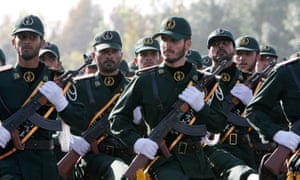Ian Black and
Saeed Kamali Dehghan

Link
Iran is escalating its role in the war in Syria, sending hundreds of men from its elite forces to support Bashar al-Assad and dispatching its most celebrated Revolutionary Guards commander to an area where an anti-rebel offensive is expected shortly.
Arab diplomats and analysts said on Wednesday that Iran had already sent hundreds of troops to northern and central Syria, after reports that up to 2,000 are to be deployed alongside fighters from Tehran’s Lebanese ally Hezbollah and foreign Shia militia units under the cover of Russian airstrikes.
Iran has backed the Assad regime from the start of the war four and half years ago, but its role so far has been relatively low-profile. Pictures of Gen Qassem Suleimani, commander of the al-Quds force of the Revolutionary Guards, addressing fighters in Syria, reinforce the perception that a new stage of deeper Iranian involvement may be beginning.
Diplomats say Iran urged Russia to intervene militarily in support of Assad after serious losses of territory and manpower this year. Suleimani visited Moscow in July, reportedly to make that point. But some experts also see a degree of competition between Moscow and Tehran for influence in Damascus.
Suleimani was pictured addressing unidentified fighters in the Latakia area. The image was distributed on Tuesday by al-Mayadeen, a Lebanese TV channel that is close to Iran and Hezbollah. This generated intense attention on social media. The channel linked his presence to a forthcoming offensive against anti-Assad rebels.
Iran has advised the Syrian army and trained Shia militia units from Iraq, Pakistan and Afghanistan. The Kuwaiti newspaper al-Rai reported that Tehran would send 2,000 troops to Syria, along with 5,000 Iraqi and Afghan Shia fighters.
“We have seen received confirmed reports of Revolutionary Guards being deployed in the hundreds in an attempt to regain territory recently lost in Aleppo by Assad,” a senior Arab diplomat told the Guardian. Another Arab source warned, however, that information about the Iranians could be deliberately misleading propaganda.Iranian fighters began arriving two weeks ago, after Russian airstrikes began, and have accelerated in recent days, an unnamed regional official told the Associated Press. The Iranians flew into Damascus airport and were transported to a base in Latakia from where they were deploying in Hama and Aleppo provinces.
The Syrian Observatory for Human Rights reported on Wednesday that Iranian troops were continuing to arrive and being sent to a base in Jableh, near Latakia.
“There is no doubt an Iranian escalation [is being] coordinated with the Russian intervention,” said Emile Hokayem of the International Institute for Strategic Studies (IISS). “There is an operational and territorial division of labour, whereby Iran contributes skilled manpower and Russia air power, probably increasingly in the form of close air support.”
Iran’s enhanced role is a risky one, as shown by the rising number of funerals held for members of the Revolutionary Guards killed in Syria in recent months. The Syrian conflict has cost the lives of more senior Iranian guards than any other conflict apart from the eight-year war with Iraq in the 1980s.
Members of the guards killed in Syria are referred to as “defenders of the holy shrine” by Iranian media. “In Qom, people are seeing such funerals almost on daily basis,” one source said. “This shows that they are sending soldiers to fight in Syria.”
Last week a senior guards commander, Hossein Hamedani, was killed near Aleppo. It emerged on Wednesday that two other senior members were killed this week: they were named as Farshad Hasonizadeh and Hamid Mokhtarband. The Isna news agency said they were helping the Syrian army and “Islamic resistance fighters”.
“It is no coincidence that three Iranian generals have been killed in just a week,” said Hokayem of the IISS. “The planning and operations of ambitious campaigns require senior oversight so more risk-taking by Iranian generals.”Hasonizadeh was a former commander of the guards special forces unit, Tip-e-Saberin. Morad Veisi, an expert on Iran’s armed forces who works with Radio Farda in Prague, said more Saberin personnel appear to have been sent to Syria.
On Monday two funerals were held in south Tehran for guards from Iran’s Fatemiyoun brigade, composed of Iran-based Afghan expatriates.
Following the rising Iranian death toll in Syria, Iranian officials have become vocal in vowing to crush “takfiri terrorists”. Mohsen Rezaee, a former guards commander, said: “We will bury takfiris in Syria and Iraq and we will prove to the world that conspiracy and deception has no place in Islam.” A takfiri is a Sunni Muslim who believes it is legitimate to kill Muslim apostates, and is Iran’s terminology when referring to Islamic State (Isis).
Ali Akbar Velayati, a foreign policy adviser to Iran’s supreme leader, Ayatollah Ali Khamenei, said this week that maintaining Assad in power remained Tehran’s red line. “Russia’s presence in Syria is important and effective,” he said. “We’ve supported Bashar al-Assad for more than four years and we will continue to do so.”

No comments:
Post a Comment